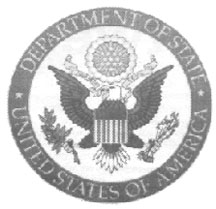I Didn’t Qualify for the Tourist Visa, What Now?
This edition of Ask the Consul addresses common questions applicants ask when refused a Tourist Visa at the U.S. Embassy.
I was refused a visa for “not demonstrating strong ties outside the United States.” What does that mean?
According to section 214(b) of the U.S. Immigration and Nationality Act (INA), “every alien shall be presumed to be an immigrant until he establishes to the satisfaction of the consular officer, at the time of application for admission, that he is entitled to a non-immigrant status.”
 In order to qualify for a Non-Immigrant Visa, applicants must demonstrate that they have strong ties abroad that will compel them to leave the U.S. at the end of a temporary stay. “Ties” are the various aspects of your life that bind you to your country of residence: your possessions, your employment, and your social and family relationships. Strong ties differ from country to country, city to city, and individual to individual.
In order to qualify for a Non-Immigrant Visa, applicants must demonstrate that they have strong ties abroad that will compel them to leave the U.S. at the end of a temporary stay. “Ties” are the various aspects of your life that bind you to your country of residence: your possessions, your employment, and your social and family relationships. Strong ties differ from country to country, city to city, and individual to individual.
How can I demonstrate strong ties if I’m young and single, or older and retired?
During the visa interview, Consular Officers look at each application individually and consider professional, social, cultural, and other factors. In cases of younger applicants who may not have had an opportunity to form many ties, or older applicants who may have fewer ties than when they were working, consular officers may look at the applicant’s specific intentions, family situations, and long-range plans and prospects within his or her country of residence.
My family member was given a Tourist Visa, but I was denied. How is that possible?
Visa applicants must qualify according to their own circumstances, not on the basis of anyone else’s circumstances. Each case is examined individually and is accorded every consideration under the law.
I’ve been refused a Tourist Visa under section 214(b). How soon can I re-apply?
Applicants refused visas under section 214(b) may reapply for a visa at any time, but must complete a new form DS-160 and pay a new application fee. When they do, they will have to show further evidence of their ties or how their circumstances have changed since the time of the original application. Applicants should not expect that a change in their situation entitles them to a visa, since there are many factors to consider.
***
“Ask the Consul” is a fortnightly column from the U.S. Embassy answering questions about U.S. immigration law and visa issues. If you have a general question about visa policy please email it to us at AskGeorge@state.gov. We select questions every other week and publish the answers in Stabroek News and on our website at http://georgetown.usembassy.gov/ask-the-consul.html . Information about visas and travel can be viewed at http://georgetown.usembassy.gov, http://travel.state.gov, and at http://www.dhs.gov. Applicants are strongly encouraged to prepare their own documents and avoid third-party advice. U.S. Consular rules change frequently and non-US government advisors often provide inadequate or inaccurate information.
Other than the questions we select, we DO NOT respond to questions sent to Ask the Consul. Please contact the visa inquiries unit (email visageorge@state. gov or call 225-7965 between 8 am and 4 pm Monday through Friday) if you have questions about a specific case.








